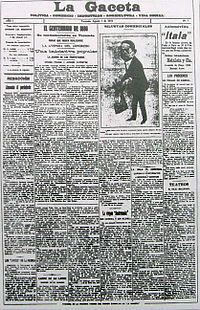
Back Portail:Conservatisme French Portal:Konservatisme NB Portal:Conservadorismo Portuguese Portal:Konservatism Swedish
| Main page | Showcase | Project |
Introduction
Conservatism is a cultural, social, and political philosophy and ideology, which seeks to promote and preserve traditional institutions, customs, and values. The central tenets of conservatism may vary in relation to the culture and civilization in which it appears. In Western culture, depending on the particular nation, conservatives seek to promote and preserve a range of institutions, such as the nuclear family, organised religion, the military, the nation-state, property rights, rule of law, aristocracy, and monarchy. Conservatives tend to favour institutions and practices that enhance social order and historical continuity.
Edmund Burke, an 18th-century Anglo-Irish statesman who opposed the French Revolution but supported the American Revolution, is credited as one of the forefathers of conservative thought in the 1790s along with Savoyard statesman Joseph de Maistre. The first established use of the term in a political context originated in 1818 with François-René de Chateaubriand during the period of Bourbon Restoration that sought to roll back the policies of the French Revolution and establish social order.
Conservatism has varied considerably as it has adapted itself to existing traditions and national cultures. Thus, conservatives from different parts of the world, each upholding their respective traditions, may disagree on a wide range of issues. Historically associated with right-wing politics, the term has been used to describe a wide range of views. Conservatism may be either libertarian or authoritarian, populist or elitist, progressive or reactionary, moderate or extreme. (Full article...)
Selected article
Early in his presidency, Reagan implemented sweeping new political and economic initiatives. His supply-side economic policies, dubbed "Reaganomics", advocated reducing tax rates to spur economic growth, controlling the money supply to reduce inflation, deregulation of the economy, and reducing government spending. In his first term he survived an assassination attempt, took a hard line stance against labor unions, and ordered the 1983 invasion of Grenada. The next year, he was reelected in a landslide. His second term was primarily marked by foreign matters, including the 1986 bombing of Libya, and the revelation of the Iran–Contra affair, and the end of the Cold War.
Selected quote
Conservative: One who admires radicals a century after they're dead.
— Leo Rosten, in R.L. Woods's The Modern Handbook of Humor (1967)
Selected image
La Gaceta was established on August 4, 1912, by Alberto García Hamilton, an Uruguayan publisher who left for neighboring Argentina following a political dispute. La Gaceta earned a reputation for conservatism, and was opposed to populist leader Hipólito Yrigoyen during the 1920s, as well as to the pro-development administration of Arturo Frondizi, who had the paper censored in 1960.
Credit: Jlazarte
Did you know...
- ...that the Ronald Reagan Trail is a collection of highways in central Illinois that connect villages and cities that were of importance to Ronald Reagan?
- ... that in 1952, after giving the Checkers speech, Richard Nixon dictated a telegram resigning as Dwight D. Eisenhower's running mate, but his campaign manager Murray Chotiner ripped it up unsent?
- ... that, in its campaign against a Romanian World War I alliance with the Entente powers, the newspaper Seara employed conservatives, socialists and anarchists as contributors?
Selected anniversaries in June
- 1979 – in the United States, the Moral Majority is founded by Jerry Falwell and Paul Weyrich.
- 1983 – the United Kingdom general election was held on 9 June. It gave the Conservative Party under Margaret Thatcher the most decisive election victory since that of Labour in 1945.
- 1987 – in a reference to the Berlin Wall, US President Ronald Reagan challenges Soviet leader Mikhail Gorbachev to "Tear down this wall!"
Topics
Associated Wikimedia
The following Wikimedia Foundation sister projects provide more on this subject:
-
Commons
Free media repository -
Wikibooks
Free textbooks and manuals -
Wikidata
Free knowledge base -
Wikinews
Free-content news -
Wikiquote
Collection of quotations -
Wikisource
Free-content library -
Wikiversity
Free learning tools -
Wiktionary
Dictionary and thesaurus
© MMXXIII Rich X Search. We shall prevail. All rights reserved. Rich X Search









